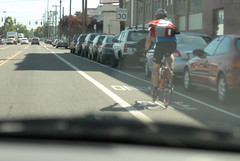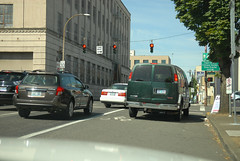Bob Wagner has seen a lot from behind the windshield of his cab. For the 20-year veteran driver with Portland-based Radio Cab Company, dealing with the mix of downtown traffic is a daily task. And that task, according to Wagner, has gotten tougher in recent years with the influx of bicycles.
“The dynamic has changed,” he said, “just a few years ago there weren’t nearly as many bikes on the road. I also notice a much more broad cross-section of people on bikes compared to the old days.”
I ended up in the passenger seat of Wagner’s cab after Radio Cab contacted me. They wanted connect with the bike community. Why would a cab company be interested in me (or the Bicycle Transportation Alliance, whom they also contacted)? I asked Wagner the same thing.
“We reached out because, just like you, we’re all about mass transit and alternative ways of getting around. We’re essentially a mass transit vehicle.” Wagner also admitted that his company sees people who ride (especially those without a car) as a prime market niche.
I suggested a drive-along. I was curious what daily life is like behind the wheel of a cab in America’s most bike-friendly big city.
Wagner picked me up from our office in the Central Eastside and we headed straight for downtown (where I assumed all the action would be). Almost immediately, he shared his frustrations. As he looked back-and-forth over his shoulders and into the rear-view mirror, he said “There’s such a mix of traffic… It’s kind of challenging.”
Wagner’s primary beef throughout our drive was that everyone — drivers, riders, pedestrians — suffers from a basic lack of understanding about the rules of the road. “The City has done a poor job educating people.” But that wasn’t his only issue. Wagner had a litany of things he wanted to share.
On the new transit mall, Wagner expressed his frustration that cabs “can’t stop anywhere” (or they’ll get a $300 fine) and that double parking would cost him $70. (He lamented that one of this customers with a disability now has to walk a full block before he can be picked up.)
But coming back to bikes, Wagner thinks part of the problem is that they’re “unregulated”. “Perhaps” he said, “they should have licenses.” Thinking that he was about to go off on ‘those crazy messengers’, I asked what he thought of them. To my surprise, he said, “Messengers? As crazy as they are, they’re really skilled riders and they’re just doing their job.”
I told him I’d be interested in seeing some sort of operator’s license for professional riders (like messengers, pedicab operators, cargo delivery riders, pedal-powered food cart vendors, and so on), but that licensing all bike riders is a much more complicated issue.
For its part, Radio Cab — which has 500 drivers and operates 120 cars in Portland — seems like a very bike-friendly company. Not only do they have thoughtful drivers like Wagner, but they’ve got a huge, secure bike parking facility in their main headquarters (which also houses the only indoor, open 24/7 gas station in Oregon). They also have a three-day training program that incorporates bicycle and pedestrian safety.
As we drove in congested areas downtown — like at the four-way stops near Powell’s and 12th — it was generally chaotic. It seems like it will take more than training, laws, the threat of tickets, or even new licenses to make a difference.
For Wagner, he just tries to stay alert. “Things have radically changed in the last 4-5 years. I have to be cognizant of 360-degrees around me at all times.”






